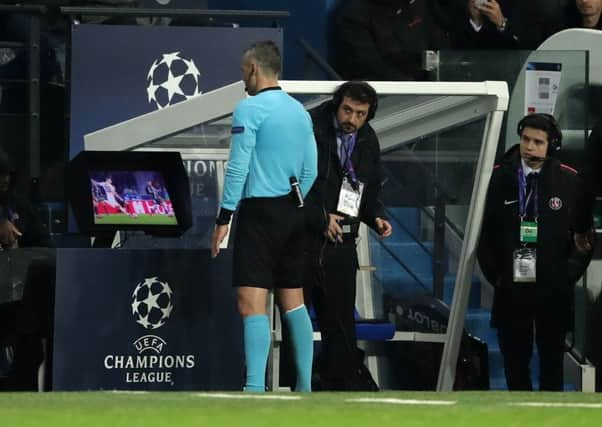Stephen Halliday: Imagine a 90th-minute VAR penalty when Celtic play Rangers


The notion that video technology can remove dubiety, debate and controversy from crucial refereeing decisions was well and truly trashed by the penalty award which saw Manchester United complete their historic Champions League comeback against Paris Saint-Germain.
Imagine, if you will, that a similar situation was to be played out in the 90th minute at Celtic Park later this month. A tense Premiership contest, being played with VAR under a one-off experiment agreed by the SPFL and Uefa, remains goalless.
Advertisement
Hide AdAdvertisement
Hide AdOdsonne Edouard drives forward and unleashes a powerful shot from just outside the penalty area. Joe Worrall leaps and twists in the air to block it. (If you prefer, please feel free to alter this fantasy scenario in your mind’s eye to an Alfredo Morelos shot being blocked by Dedryck Boyata – this column wouldn’t want to be considered anything less than neutral by its friends on both sides of the Old Firm divide).
The ball strikes the defender and loops behind for a corner kick. To the naked eye of most observers, there is nothing more to the incident and they prepare to watch the set-piece being taken.
But a hopeful and perhaps purely instinctive appeal for a penalty from the striker is spotted by the video assistant referee who decides to conduct a review. The match referee is alerted through his earpiece and play is halted. It is eventually suggested to the referee that there has been what VAR protocol describes as a “serious missed incident”. He duly trots over to a video screen at the mouth of the Celtic Park tunnel. He is now the single focus of attention for 60,000 fans inside the stadium – not to mention the piercing and anxious gazes from Neil Lennon and Steven Gerrard in the nearby technical areas.
After what feels like an interminable number of replays, the referee turns and points to the spot. The penalty, which is likely to prove ultimately decisive in determining the outcome of the title race, is slotted home.
So, hands up if you think everyone involved would gracefully accept that outcome and spare the referee from any criticism because the infallible VAR was involved. Anyone? Thought not.
Uefa has published the justification for Slovenian referee Damir Skomina’s decision to award Manchester United their dramatic tie-clinching penalty, stating that PSG defender Presnel Kimpembe’s arm was not close to his body as he blocked Diogo Dalot’s shot which, they say, did not travel a short distance.
It was only one of several incidents in the Champions League this week which saw the use of VAR spark arguments rather than resolve disputes. No Real Madrid fan will ever be convinced that the ball was not out of play in the build-up to Ajax’s third goal in their stunning win at the Bernabeu, while Roma were left to bemoan two VAR penalty decision reviews which went against them as they were eliminated by Porto.
If VAR isn’t going to bring unanimity of opinion over refereeing decisions in the world’s highest profile club competition, then there is little hope of it quelling the hysteria which so often surrounds match officials in the febrile world of Scottish football. On the contrary, it may only exacerbate the unacceptably hostile environment referees in this country have found themselves operating in this season.
Advertisement
Hide AdAdvertisement
Hide AdThe Scottish FA and SPFL have committed themselves to exploring the viability of introducing VAR, which has the backing of Premiership managers who reckon it would see a higher percentage of correct decisions reached. They should be careful what they wish for. As this week has highlighted in bold, what constitutes a “correct” decision remains very much open to interpretation with VAR.
The arrival of VAR in the English Premier League next season should prove more instructive in assessing whether it would bring more positives than negatives over a sustained period. For the moment, Scottish football might be best served in approaching its refereeing issues from a different perspective and try to treat the cause rather than the symptom. Perhaps the estimated sum of around £1.5 million a year needed to implement VAR in the Scottish Premiership could instead be used to enhance the recruitment, training and development of our match officials.
Their standards can be improved, while recognising they will always make mistakes. But, as many can argue this week, so too will VAR.